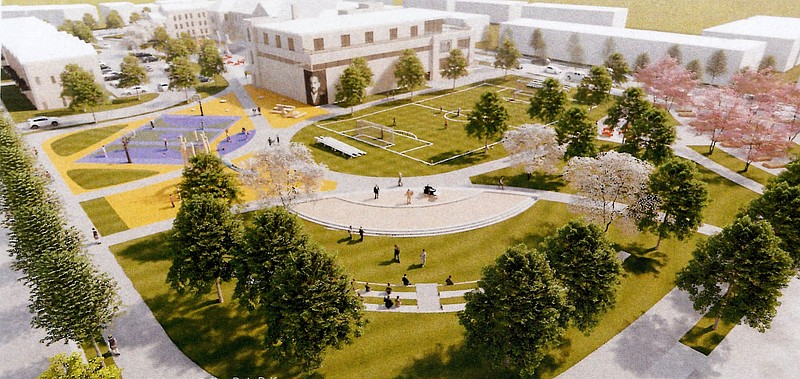With help from the city, county and Uncle Sam, the Chattanooga Housing Authority is looking to redevelop its oldest and biggest housing project and surrounding areas with nearly $1 billion of mixed-use housing and support facilities over the next decade.
Three years after the housing authority and the Chattanooga Design Studio began meetings with residents of College Hill Courts about reimagining their neighborhood, housing authority Executive Director Betsy McCright told the Chattanooga Rotary Club the first phase of the authority's biggest redevelopment plan should be underway by next year.
"We've done a lot of revitalization of our other housing projects, but never one with the scale and size of this," McCright said in an interview after her speech to the club Thursday at the Chattanooga Convention Center. "This is a huge and important project and will help integrate market-rate rental units and new commercial space with our subsidized housing and will help connect this enclave with the rest of downtown."
Earlier this week, the housing authority board voted to begin negotiations with Columbia Residential to develop a plan for Chattanooga's Westside and to help the city secure federal grants and tax credits to finance new housing and commercial development in the area. Columbia Residential has developed more than 10,000 rental units at similar housing projects around the country and will help the housing authority prepare an application for a Choice Neighborhood grant that could pump $50 million of additional federal funding and ongoing housing tax credits into the area.
Last year, the city of Chattanooga and Hamilton County both committed $2 million of federal assistance money for the Westside Evolves project to help renovate the former James Henry School and the Sheila Jennings Park, among other improvements. Another $3 million federal grant was awarded for other improvements and planning in the area.
The government assistance has helped expand the Head Start program in the former elementary school.
The initial phase of the housing project will be a new 119-unit apartment complex that will be built on the West 12th Street site where Chattanooga's Department of Youth and Family is now headquartered. The existing city building will be torn down and the Department of Youth and Family relocated to redevelop the site and ensure there are housing units available in the neighborhood.
The housing authority plans to ultimately to demolish and replace both the 497-unit College Hill Courts and the 132-unit Gateway Tower.
"We want to build first with new housing so that those who might be displaced during the redevelopment of this area will have a place to live," McCright said.
Work on the first housing complex is expected to begin in 2024 and take about 18 months to erect, McCright said.
Eric Myers, executive director of the Chattanooga Design Studio, told the Rotary Club more than 2,000 people now live in the Westside area bounded by U.S. 27, M.L. King Boulevard and Riverfront Parkway, and more than 86% of the residents participated in surveys or meetings about the Westside plans.
The redevelopment plan, which has been taking shape with the help of the EJP Consulting Group since 2020, is seeking to maintain key historic parts of the neighborhood, including a 100-year-old Oak tree and a longtime flagpole, while also bringing new market-rate housing into the downtown community.
The housing authority has committed to maintaining the number of subsidized housing units it currently has in the area, even as the nearby Bend across Riverfront Parkway and the Cameron Harbor community across M.L. King Boulevard both bring hundreds of new upscale apartments and condominiums into the region.
Myers said the partnerships that the housing authority and planners have developed with city, county, federal agencies and housing developers and residents will be key to the ultimate funding and success of the redevelopment.
More information about the plan is available at www.westsideevolves.com.
Contact Dave Flessner at dflessner@timesfreepress.com or 423-757-6340.

